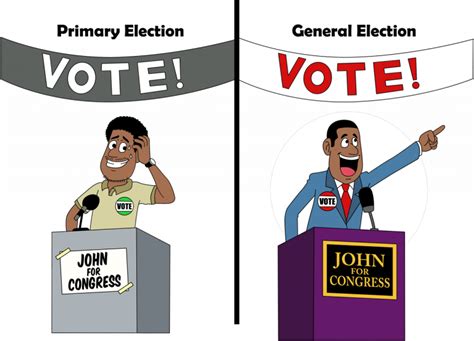What is a Primary Election?

A primary election is a preliminary election held to select a party’s candidates for office in the general election. The candidates who receive the most votes from their party’s voters secure the party’s nomination.
Key Features of Primary Elections:
- Closed or Open: Closed primaries allow only registered party members to vote, while open primaries allow unaffiliated voters to participate.
- Types: Primary elections can be closed primaries, open primaries, or “jungle primaries” where all candidates compete in a single election regardless of party affiliation.
- Delegates: In some states, primary elections award delegates to candidates based on the number of votes they receive. These delegates then attend the party’s national convention to select the party’s presidential nominee.
What is a General Election?
A general election is the final election where voters cast their ballots to select the candidate who will hold the elected office. The candidates running in the general election are typically the party nominees from the primary elections.
Key Features of General Elections:
- Open to All Voters: All registered voters are eligible to vote in general elections, regardless of party affiliation.
- Direct Election: Voters directly elect the candidate who will hold the office.
- Winner-Take-All: In most elections, the candidate who receives the most votes wins the election, regardless of the percentage of votes received.
Differences Between Primary and General Elections
| Feature | Primary Election | General Election |
|---|---|---|
| Purpose | Select party candidates | Elect office holders |
| Eligibility | Party members (closed primaries) or all registered voters (open primaries) | All registered voters |
| Election Type | Direct or caucus | Direct |
| Candidates | Party nominees | Nominees from all parties |
| Voter Turnout | Typically lower | Typically higher |
Types of Primary Elections
There are four main types of primary elections:
1. Closed Primary Elections
– Only registered party members can vote.
– Encourage party loyalty and strengthen party organization.
2. Open Primary Elections
– Unaffiliated voters can participate.
– Allow voters to express their views across party lines.
3. Semi-Closed Primary Elections
– Allow unaffiliated voters to vote for any candidate but require them to declare party affiliation.
– Moderate impact on party loyalty.
4. “Jungle” Primary Elections
– All candidates compete in a single election.
– The top two vote-getters advance to the general election, regardless of party affiliation.
Importance of Primary Elections
Primary elections play a crucial role in the American electoral process by:
- Influencing General Election Outcomes: Primary elections often determine the candidates who run in the general election.
- Evaluating Candidates: Voters get an opportunity to assess the qualifications and policies of potential candidates.
- Encouraging Political Engagement: Primary elections increase voter participation and promote political dialogue.
Importance of General Elections
General elections are equally important as they allow voters to:
- Select Office Holders: Voters have the power to directly elect the individuals who will represent their interests and govern their communities.
- Hold Elected Officials Accountable: General elections provide voters with an opportunity to assess the performance of incumbent officials and hold them responsible for their actions.
- Ensure a Democratic Process: General elections ensure that the government is responsive to the will of the people and that all citizens have the right to participate in the political process.
Conclusion
Primary and general elections are essential components of the American electoral system. Primary elections provide a mechanism for parties to select their candidates, while general elections allow voters to elect office holders and hold them accountable. Understanding the differences and importance of each type of election is crucial for informed civic engagement and an effective democracy.
